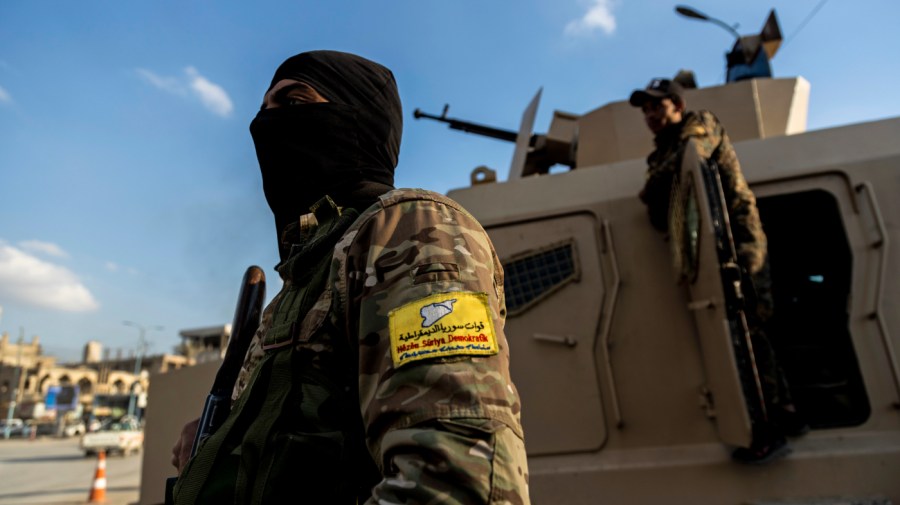
The situation in Syria has reached a critical juncture, with United States resolve and leadership tested once again. Following the overthrow of the Assad regime by Turkish-backed Hay’at Tahrir al-Sham (HTS), Turkey’s plans to destroy the Syrian Democratic Forces (SDF) are now underway.
In December, Turkish-backed Syrian National Army (SNA) forces took control of the Manbij area and, together with Turkey, have amassed forces to attack Kobani — a city symbolic of resistance against ISIS. It was in Kobani that the United States and Kurdish forces forged an alliance that ultimately reversed ISIS’s expansion.
Turkey, which controls the Syrian National Army and has been the main backer of HTS — the two main power holders in Syria after the Assad regime’s fall — seems unwilling to allow Syrians to address the numerous issues they face. Instead, Turkey is moving rapidly to build on its allies’ victory over Assad to achieve its strategic goal, as Turkish Foreign Minister Hakan Fidan has stated is “the elimination” of the SDF and control of northeastern Syria.
Militarily, the SDF, though one of the most effective fighting forces in the region, is under immense pressure. It faces multiple fronts opened by Turkey and its allies, coupled with relentless Turkish airstrikes. The battle is no longer an even contest.
The so-called “rebels” have seized much of the Syrian army and enjoy full support and coordination with NATO’s second-largest military — Turkey — which provides them with both ground forces and air support. On the other hand, the United States has limited its involvement to counterterrorism operations, and no other country or power is directly supporting the SDF.
There is no doubt that the SDF will resist with all its might. However, while SDF fighters have displayed extraordinary courage and effectiveness on the battlefield, they are now up against a coalition with air power, heavy artillery, and advanced military resources.
The battle for northeastern Syria will not be as easy for Turkey and its Syrian militant allies as it was against Assad’s exhausted and under-resourced army. However, without air support or air defense systems, it would take nothing short of a miracle for the SDF to achieve victory in an open war.
The consequences of Turkey’s and its Islamist allies’ potential takeover of northeastern Syria are profound, with significant implications for U.S. national security interests.
Thousands of ISIS members currently detained in northeastern Syria could be released, providing the conditions for the resurgence of ISIS 2.0. Such a development would enable ISIS to regain control of territory and pose a renewed threat to the United States and its allies in the region. The recent attack in New Orleans shows the continued risk.
This takeover would also deal a severe blow to the United States’ image as a reliable partner. The SDF has proven to be one of the most trusted and effective allies the U.S. has had in decades. An American retreat, similar to the chaotic withdrawal from Afghanistan, would signal to the world that the United States cannot be relied upon to see its commitments through to the end.
Geopolitically, if the U.S. loses its partnership with the SDF, it will have little leverage over HTS, which evolved from Jabhat al-Nusra and is a designated terrorist organization, or over SNA. Without the two thousand boots on the ground, the United States will lose its ability to influence Syria’s future, aside from additional sanctions, which could mean another crisis and another lost opportunity for both the United States and the people of Syria.
The U.S. has outlined several key demands regarding the future of Syria — including the protection of minorities and ensuring Syria does not become a haven for terrorism or instability. Without a physical presence in the region, Washington’s capacity to enforce these demands will be significantly diminished.
Religious minorities in the region will be among the top targets of the radical groups now empowered by the Turkish-backed forces and more so if ISIS is to resurge and control territory once again.
The precedent is clear. Following the takeover of Afrin in 2018 by the SNA and Turkey, Yazidis, Christians and Kurds faced direct persecution, displacement, and, in some cases, severe human rights violations, such as forced conversion, and other crimes akin to the atrocities committed by ISIS.
If Turkey and its allies seize control of northeastern Syria, Yazidis, Christians, Kurds and other minority groups will face severe threats to their safety, potentially including mass displacement, persecution, or even enslavement, as witnessed during ISIS’s reign of terror. Minorities under the SDF are not only protected but involved in self-governance and treated as equal members of society, the opposite of conditions under Turkey and the SNA.
We call on the United States to undertake a comprehensive and multi-faceted approach to defend the SDF and the people of northeastern Syria. This effort should include supporting legislation introduced by Sens. Lindsey Graham (R-S.C.) and Chris Van Hollen (D-Md.) to impose comprehensive sanctions on Turkey if it proceeds with its current plans.
Furthermore, the U.S. should provide direct military aid to the SDF, including air defense systems, to give them a fighting chance in this asymmetrical war. America’s credibility, the fate of its most trusted allies, and the stability of an entire region are at stake.
Murad Ismael is the president of the Sinjar Academy and co-founder and former executive director of Yazda. Nadine Maenza is the president of IRF Secretariat, a global fellow at The Wilson Center, and former chair of the U.S. Commission on International Religious Freedom.












